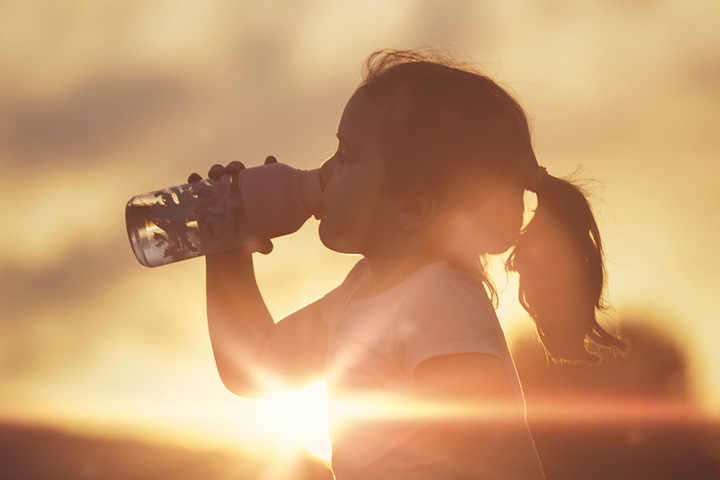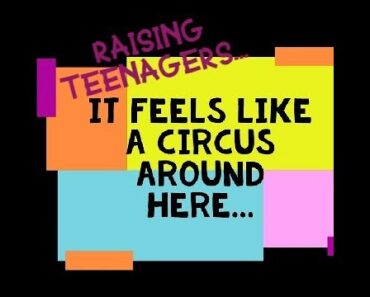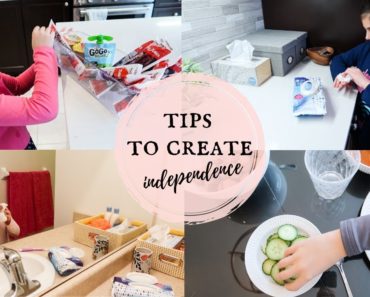Image: Shutterstock
Dehydration refers to an excessive loss of water and salt from the body, leading to an imbalance of electrolytes in the body (1). This imbalance can affect the vital organs and hinder normal body functioning.
Generally, dehydration can affect people at any age. However, dehydration in children, especially young children, is critical as they can lose fluids rapidly and develop severe dehydration.
Dehydration can be mild, moderate, or severe. In mild and moderate dehydration cases, replenishment of lost electrolytes using oral rehydration therapy may resolve the problem. However, in severe cases, medical intervention is necessary.
Read on to know more about the signs and symptoms, common causes, appropriate diagnosis, treatment options, and prevention measures for dehydration in children.
Signs And Symptoms Of Dehydration
The signs and symptoms of dehydration vary depending on the extent of fluid and electrolyte loss. The following are some signs and symptoms that a child with mild to moderate dehydration can exhibit (1) (2) (3).
- Restlessness and irritability
- Dry mouth and cracked/parched lips
- No tears when crying
- Dark yellow or brown pee
- Less urination
- Reduced body weight
- General weakness and decreased activity than usual
- Loose stools if dehydration is due to diarrhea
- Decreased bowel movements if dehydration is due to vomiting or reduced fluid intake
Dehydration, when left untreated, can turn severe and cause the following symptoms.
- Looking extremely thirsty
- Sunken eyes
- Dry, wrinkled, peeling skin due to loss of skin elasticity
- Discolored hands and feet cold to touch
- Excessive sleepiness and lethargy
- Urination no more than once or twice a day
- Dizziness or drowsiness
- Increased heart rate
- Unconsciousness
If your child exhibits any of the symptoms mentioned above, consult your pediatrician to follow the proper management and treatment course.
Causes Of Dehydration
Dehydration can be caused by various factors, including (4) (5)
1. Excessive sweating: Sweating is a normal physiological process that regulates body temperature. During sweating, the body loses salt-based fluids, which one can replenish by drinking fluids. However, excessive sweating can lead to dehydration. Extended exposure to hot and humid weather, excessive exercise or physical activity, and hyperhidrosis can cause dehydration in children. Hyperhydrosis is abnormally excessive sweating that doesn’t happen due to heat exhaustion or exercise (6).
2. Diarrhea and vomiting: In healthy children, occasional diarrhea and vomiting are not a cause for concern. However, explosive diarrhea and frequent vomiting can lead to dehydration. Infections, such as acute viral gastroenteritis (stomach flu), and gastrointestinal diseases, such as celiac disease, can cause excessive water and salt loss from the body, leading to dehydration in children (7) (8).
3. Fever: Some infections and diseases can cause fever. The higher the fever, the greater the risk of dehydration due to sweating. This risk increases if the child doesn’t drink sufficient water and has accompanying conditions, such as diarrhea, vomiting, or both. In such instances, dehydration can set in quickly and turn severe.
4. Certain illnesses: Certain health conditions, such as sore throat, make drinking water difficult for children and increase the risk for dehydration. This risk amplifies if the child is on certain medications, such as diuretics, which raise fluid loss from the body.
Dehydration in children needs prompt diagnosis and treatment, as it can affect their growth and development and long-term health.
Diagnosis Of Dehydration
Diagnosing dehydration involves ascertaining the severity of dehydration and determining the precise cause of dehydration. The doctor will note the child’s symptoms and collect their medical history.
Based on the suggestive findings, they are likely to perform the following tests to understand the exact cause of dehydration (3) (9).
1. Physical examination: During the physical examination, the doctor will check the child’s vital signs and look for evident signs of dehydration, such as dry mouth and tongue, chapped lips, dry skin, and abnormal skin turgor (wrinkling of the skin due to dehydration). Based on the symptoms, the doctor will measure the level of dehydration using the clinical dehydration scale (CDS).
Clinical dehydration scale: The scale includes point-based dehydration signs and symptoms against which the child’s symptoms are compared. Higher points indicate severe dehydration. Here’s the scale parents can refer to and check their child’s score.
0 | 1 | 2 | |
General Appearance | Normal | Thirsty, restless, or lethargic but irritable when touched | Drowsy, limp, cold, sweaty |
Eyes | Normal | Slightly sunken | Very sunken |
Mucous membranes | Moist | Sticky | Dry |
Tears | Present | Decreased | Absent |
2. Blood and urine test: A complete blood picture or complete blood count can help the doctor know if the child has an infection. Depending on the result, they may ask for a blood culture to know the specific cause of infection. The doctor may also conduct a urinalysis test to tell whether your child is dehydrated and to what degree.
Treatment For Dehydration
Depending on the child’s age and symptoms and the cause and severity of the symptoms, the doctor will chart a treatment plan. The treatment plan will aim to reestablish water and electrolyte balance, resolve the dehydration cause, and treat complications, if any (3) (10) (11).
- No dehydration (Score of 0 on CDS)
If the child scores 0 on the dehydration scale, it means they aren’t dehydrated. Such children should have a well-balanced, age-appropriate diet containing healthy fluids, such as soups and coconut water. If the child has vomiting or diarrhea, offer them diluted juices and ORS (oral rehydration solution). According to UNICEF, children aged two years and above require half to one cup (250ml) of ORS after each watery stool episode (12).
- Mild dehydration (Score of 1 to 4 on CDS)
One can treat mild dehydration using ORT (oral rehydration therapy), which involves feeding ORS to the child. The doctor may suggest feeding ORS powder or pre-mixed ORS drinks, such as Pedialyte or Hydralyte. These products contain water, sugar, and salts the body needs. One to two teaspoons of ORS every five minutes is appropriate if the child has frequent diarrhea or vomiting.
Once the vomiting and diarrhea subside, the child can have healthy fluids, such as diluted apple juice, soups, and coconut water. Upon recovery, the child can gradually shift to an easy-to-digest, soft diet containing complex carbohydrates, protein-rich lean meats, and various fruits and vegetables to regain lost nutrients and prevent malnutrition.
- Moderate to severe dehydration (Score of 5 to 8 on the CDS)
Children with moderate dehydration may need treatment at the hospital. Once they get stable, they can go home and continue with oral rehydration therapy. As the child recuperates and the frequency of diarrhea and vomiting reduces, they may be introduced to a soft diet.
Children with severe dehydration need to be administered intravenous fluids (IV) until they are stable and comfortable taking oral fluids.
Note: Feeding only water to treat mild to moderate dehydration isn’t sufficient. It can lead to low blood sugar or low sodium in the blood, triggering complications.
Complications Of Dehydration
Dehydration doesn’t lead to complications if treated on time. However, if it persists or worsens, it can lead to severe complications, including (13) (14)
- Malnutrition affecting growth and development.
- Low blood sodium (hyponatremia).
- Severe electrolyte loss leading to seizures.
- Urinary tract infections (UTIs) and kidney problems.
- Reduced blood pressure due to low blood volume, resulting in hypovolemic shock.
- Shortage of oxygen in the blood (hypoxemia).
- Brain damage and death.
How To Prevent Dehydration In Children?
Dehydration is preventable in most cases. You can follow the following steps to ensure your child is well hydrated.
1. Ensure your child drinks plenty of water. Experts recommend children aged four to eight years drink at least seven cups of water per day. On the other hand, children aged nine to 18 should drink nine to ten cups (15). The total water requirement can be higher depending on the child’s physical activity and climatic conditions.
2. Make your child drink extra fluids, such as fresh, homemade lemonade and coconut water when the weather is hot and humid. Watch your child’s clothing is weather-appropriate so that they do not sweat excessively.
3. Avoid feeding drinks containing sugar and caffeine as they act as diuretics, which can cause water and electrolyte loss from the body.
4. Remind your child to drink water and other fluids if they tend to forget drinking water. You may use water reminder apps for older children who have mobile phones.
5. Plan and feed your child various fluids in the form of cordials, lemonade, popsicles, or ice chips if they refuse to drink sufficient amounts of water.
6. Pay heed to the signs of dehydration when your child is sick. Promptly follow appropriate measures, such as feeding ORS to replenish lost fluids.
7. Monitor the number of times your child vomits or passes loose or watery stools. Hydrate your child to keep their mouth moist and urine output normal.
8. Ensure your child drinks plenty of water and ORS if they do intensive exercise or indulge in high-intensity sports, which usually cause excessive water loss. Avoid using commercial sports drinks as they often contain high amounts of sugar.
9. Guide your child to drink water before and after exercise or sports activity. They should sip water at regular intervals during the activity to help replenish lost fluids.
10. Reduce dehydration risk by planning your child’s outdoor and sports activities in the morning or evening hours if you stay in a hot and humid environment.
Dehydration in children is a common condition that one can manage with prompt oral rehydration. In most cases, intake of plain water, ORS, and other healthy fluids, such as coconut water, helps retain the lost electrolyte balance. However, if dehydration persists or worsens, it can lead to severe complications. Therefore, staying alert to the signs and symptoms is vital for the early management of dehydration.


































